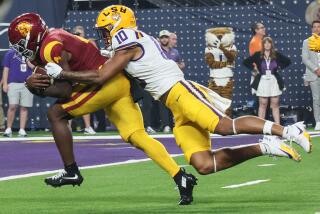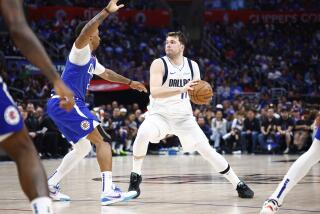âMonday Nightâ Headed to ESPN
For 35 years, it has been one of the rare constants on network television: Every Monday night in the fall, Americans have gathered by the millions to watch ABCâs âMonday Night Football.â
Legendary TV producer Roone Arledge created the franchise in 1970, installing Howard Cosell, Don Meredith and Keith Jackson in the broadcast booth. The trio of Cosell, Meredith and Frank Gifford became the best-known face of the show. In the process, Arledge simultaneously transformed both professional sports and prime-time network entertainment. Each Monday was more than just a game; it was a shared cultural experience.
â âMonday Night Footballâ became part of the landscape,â said Art Modell, former owner of the Cleveland Browns. âPeople talked about it Tuesday morning around the water cooler, debating Cosell, Meredith, this player, that player.â
All that changed Monday when National Football League executives announced that the pillar of the ABC lineup will move to ESPN starting with the 2006 season. The Walt Disney Co., which owns ESPN and ABC, will pay about $1.1 billion a year for the rights to 17 Monday night games on ESPN, or more than $8.8 billion over the life of the eight-year agreement.
The move signaled the growing clout of cable television and the increasingly specialized way Americans are consuming their entertainment.
It also marked Disney President Bob Igerâs first major decision since he was named to succeed Chief Executive Michael Eisner, who is retiring.
In recent years, ABC has lost hundreds of millions of dollars on the franchise, which despite high ratings does not generate enough advertising revenue to cover its costs. ESPN, by contrast, has two revenue streams: cable subscriber fees and commercial spots.
Disney executives, happy to be keeping the Monday games under their corporate umbrella, downplayed the significance of the shift from network to cable.
âIt will be tough for ABC to say goodbye to a landmark,â said George Bodenheimer, president of ESPN and ABC Sports. âBut weâre not looking back. It is not the end of an era. It is the beginning of a new era.â
But Marc Gunther, co-author of the 1988 book âMonday Night Mayhem: The Inside Story of Monday Night Football,â disagreed.
âThis is the end of a television institution,â he said, noting that ironically, the franchise âfell victim to its own popularity. Because the NFL was able to charge such a huge rights fee for it, that ABC was no longer able to afford it.â
General Electricâs NBC network was the immediate beneficiary, scooping up a Sunday night football package that will begin in the fall of 2006. NBC, which took a pass on the NFL beginning in the 1998 season rather than lose money, spent the weekend negotiating the $600-million-a-year deal for six years, or a total of $3.6 billion.
For hard-core fans, the new arrangement may not change much. Already, the broadcast networks were not airing all NFL games. To watch every one, fans have to subscribe to a cable or satellite provider. For example, ESPN now runs the Sunday night package that NBC will soon broadcast.
Mondayâs announcement came five months after the NFL hammered out three other TV rights packages with CBS, Fox Broadcasting and DirecTV. The combined deals maintain the NFL as the most expensive property in all of professional sports. All together, the NFLâs TV rights deals add up to more than $23 billion over eight years.
Robert Kraft, owner of the New England Patriots, said the high prices being paid to broadcast NFL games were a testament to âthe quality of the product we put on the field. If you give people quality, theyâll stick with you in the bad times and the good times.â
As part of the deal, after next yearâs Super Bowl, no Disney-owned channel will air the largest television event of the year. Instead, the Super Bowls will continue to play on broadcast networks that reach most of the nationâs nearly 110 million homes with TV sets: CBS, NBC and Fox Broadcasting Co.
ESPN, by contrast, is available to about 88 million households. Beginning in 2006, however, it will be difficult to estimate how many people watch âMonday Night Footballâ because it will run not just on ESPN but also on broadcast networks in the local markets of the playing teams.
Sources close to the negotiations said that as late as Friday morning, Iger made one last effort to keep âMonday Night Footballâ on ABC. Disney bid about $1.5 billion a year, those sources said, to continue Sunday night games on ESPN and Monday night games on ABC.
When the NFL rejected the offer, Disney scaled back its bid to $1.1 billion a year for just âMonday Night Footballâ on ESPN. (It will begin at 5:40 p.m. Pacific time instead of 6 p.m.).
ABC has promised Wall Street that the network will soon be profitable. Now, executives say the combination of several new hit prime-time programs and the shedding of its money-losing football deal makes profitability more likely.
Disney officials said that the success of âDesperate Housewives,â which airs Sunday nights at 9 p.m., played a big role in its decision not to bid for the Sunday night package.
âYouâd be foolish to mess with a hit like Desperate Housewives,â said Mark Shapiro, ESPNâs executive vice president of programming and production.
Bodenheimer agreed, saying that âMonday Night Footballâ no longer made sense for ABC. âWalking away makes our prospects brighter,â he said.
Analysts were less glowing.
âThis is a mixed bag for Disney,â said Lowell Singer of S.G. Cowen & Co. âThey are going to eliminate their $150 million a year losses on ABC, but they are going to be paying $500 million a year more than they are now for the NFL on ESPN.â
Singer and others speculated that Disney agreed to pay more for football on ESPN in the hopes of blocking News Corp.âs Rupert Murdoch from launching his own national sports cable network. âESPN is paying a big price to minimize the risk that News Corp. or anyone else will launch a competing sports network,â Singer said.
NBC executives said they were only interested in the Sunday night package after the NFL signaled that it was willing to provide a flexible schedule during the last seven weeks of the season.
NBC predicted Sunday night games would draw bigger ratings because on a weekend, West Coast football fans wonât be âstruggling on the highway trying to get home to watch a game that starts a little after 6 oâclock,â NBC Universal Sports Chairman Dick Ebersol said.
NBC also did not want lengthy football games to disrupt the start of âThe Tonight Show with Jay Leno.â The show generates profits of more than $100 million a year.
The NFL deal comes as NBC has lost its prime-time dominance, falling from first place to fourth place among the key 18 to 49 year-old demographic.
Now, NBC will have a solid Sunday night lineup at least for the first part of the television season. It plans a pregame show beginning at 4 p.m., with kickoff at 5:15 p.m. Pacific time. NBC said it has not decided who will announce the games.
NBC Universal Chairman Bob Wright sounded gleeful that after âa brief eight-year hiatus,â as he put it, NBC was off the sidelines and back in the game.
As part of the deal, the league and its teams will have a partnership with General Electric that could lead to NFL teams using GE lighting, medical equipment, financing and security systems.
âIt will be profitable,â Wright said.
The NFL still has one outstanding television package. Later in the year, it expects to negotiate its late-season Thursday and Saturday night packages.
âMonday Night Footballâ may be the highest-rated sports programming to migrate to cable from broadcast, but it isnât the first. In 2002, the NBA moved the bulk of its games to cable under a new six-year contract with ESPN, TNT and ABC.
As ratings have declined and sports rights fees have continued to skyrocket, sports programming has become largely a loss leader for broadcasters. In 2002, News Corp. took a $909-million charge against earnings to account for losses on the NFL, NASCAR and Major League Baseball.
ESPN has a reputation for using its leverage with avid sports viewers to extract stiff rate increases from cable operators. The network increased rates by 20% annually in recent years to help pay for its last NFL deal, although the latest round of contract renewals with cable operators have whittled those price hikes to an average of 7% a year.
Bodenheimer said, however, that Disney would not be looking for rate increases from cable operators to pay for the increased cost of âMonday Night Football.â
Although Arledge put âMonday Night Footballâ on the air, the idea came from two visionaries: the late Pete Rozelle, then commissioner of the NFL, and Modell, former owner of the Cleveland Browns.
They flirted with the idea of playing the games on Friday night but backed off when high school and college football enthusiasts balked. Rozelle initially approached the dominant CBS and NBC about a Monday night game, but network chieftains rejected it.
CBS had âGunsmoke,â and NBC had the top-rated show, âRowan and Martinâs Laugh-Inâ on Monday nights. It even took a while to convince the third-place ABC network.
*
Times staff writers Sallie Hofmeister and Larry Stewart contributed to this report.
More to Read
The biggest entertainment stories
Get our big stories about Hollywood, film, television, music, arts, culture and more right in your inbox as soon as they publish.
You may occasionally receive promotional content from the Los Angeles Times.












